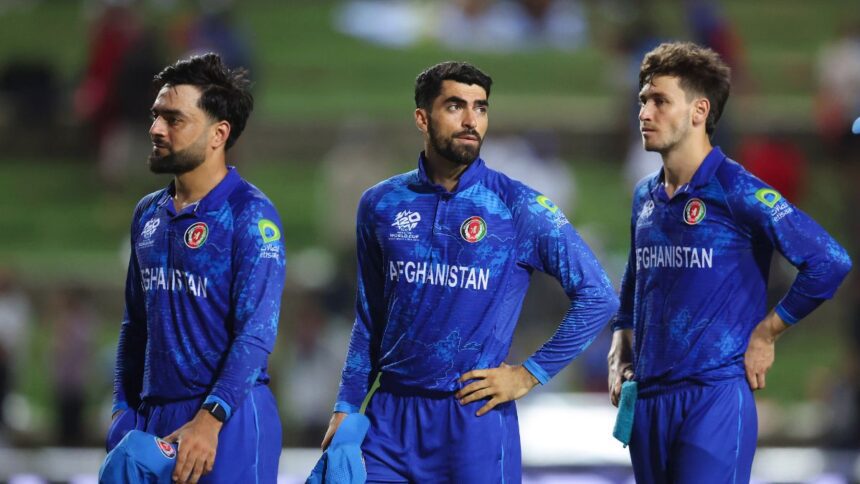The Moral Dilemma of Sports and Gender Equality: South Africa’s Stance on Afghanistan’s Cricket Team
In a bold and distressing declaration, South Africa’s sports minister, Gayton McKenzie, has taken a firm stand against the International Cricket Council (ICC) for allowing Afghanistan’s men’s cricket team to compete in global tournaments. This criticism came to a head as South Africa prepares to face Afghanistan in a crucial group stage match during the ICC Champions Trophy 2025 in Karachi, scheduled for February 21.
McKenzie’s outrage is rooted in the Taliban’s oppressive regime and its blatant discrimination against women, particularly in the realm of sports. Since the Taliban regained power in Afghanistan in 2021, a plethora of reports has highlighted the systematic crackdown on women’s rights. Women are barred from participating in sports—a direct contradiction to the values of equality and inclusion promoted in international sporting events.
The Impending Clash: Context and Implications
Afghanistan’s qualification for the Champions Trophy was achieved through an impressive performance in the ODI World Cup 2023 held in India. However, their participation comes with heavy moral scrutiny. The Afghan men’s cricket team’s presence in an international tournament serves as a stark reminder of the Taliban’s regressive policies. It poses an ethical conundrum for countries like South Africa, which holds a historical significance in fighting against apartheid and discrimination.
Protests and calls for boycotts have escalated, especially from Australia, which has been vocal in its opposition to the Taliban’s stance on women’s rights. Recently, over 160 politicians in the UK urged the England and Wales Cricket Board (ECB) to consider withdrawing from the Champions Trophy match against Afghanistan. The chorus of dissent amplifies when one considers McKenzie’s assertions regarding moral responsibility.
A Voice for Women in Sports
Minister McKenzie articulated powerful sentiments reflecting a personal and collective history of oppression during apartheid in South Africa. “As a man who comes from a race that was not allowed equal access to sporting opportunities during apartheid, it would be hypocritical and immoral to look the other way today when the same is being done towards women anywhere in the world," he stated. His perspective urges a stronger global conscience to advocate for women’s rights in sport, especially in contexts where their participation is outright banned.
The call to action does not fall solely on cricketing bodies. McKenzie encourages not only the ICC but all sports federations worldwide to reconsider their affiliations with Afghanistan. He argues that political interference in sports governance, particularly regarding gender equality, should not be tolerated. His message urges a collective awakening among fans, players, and administrators in the pursuit of solidarity with women athletes facing oppression in Afghanistan.
The Broader Consequences
The debate surrounding Afghanistan’s cricketing participation is a microcosm of a larger issue—how sports can serve as a platform for social justice. Allowing the Afghan men’s cricket team to participate may send conflicting messages. While it promotes the spirit of sport, it concurrently undermines the plight of women who are denied the same rights. The sports community is left to grapple with the implications of such tolerance: Does it signify an endorsement of Afghanistan’s policies? Or does it reflect a separation of sport from political and moral considerations?
Globally, sports organizations like FIFA and the ICC have faced similar scrutiny in the past over their ties with nations that violate human rights—even as they profess commitments to upholding principles of diversity and inclusivity. The current landscape demands a reevaluation of how sporting bodies engage with regimes that perpetuate gender inequality.
Conclusion
As the world keenly watches the upcoming ICC Champions Trophy, the discussions initiated by Gayton McKenzie present an opportunity for a crucial dialogue about ethics in sports. The intersection of sports and human rights, particularly regarding gender equality, remains a contentious issue that transcends borders.
The ongoing situation with Afghanistan’s cricket team invites not just protests and boycotts but also a reexamination of our values as a global community. Can sports be the unifying force it’s often touted to be if they simultaneously coexist with gross injustices? As the February match approaches, sports fans, players, and administrators alike must reflect deeply on the messages their choices send to the world—especially to the women of Afghanistan, who continue to fight for a chance to pursue their dreams against all odds.










